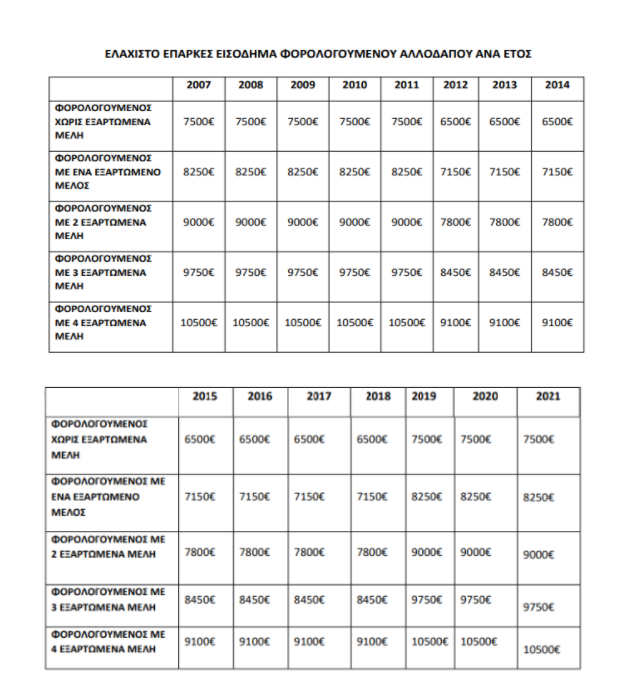New naturalization process: what is it about?

The naturalization process presents significant changes adopted by Laws 4735/2020 and 4873/2021 as well as the latest circular of the Ministry of Interior. Those who have already applied or those who wish to apply for naturalization in the future should be aware of the new provisions. The key points are the examinations for the Certificate of Knowledge Adequacy for Naturalization (Greek abbreviation: PEGP), the application for naturalization, the minimum sufficient income and the abolition of the oral interview. Below we gathered useful information by topic for those who are interested:
1) Naturalization Exams
– Those who have already submitted an application for naturalization under the previous system, until 31/03/2021, and had nοt been interviewed by the Naturalization Committee until then, must take exams and obtain the PEGP*. Those who have studied for a given number of years in the Greek primary school, ‘gymnasio’ (elementary school), ‘lykio’ (high school) or AEI and TEI (Greek abbreviation for universities)** are exempted from these exams and have to submit the certificates from the schools or the diplomas to the Citizenship Directorate, where the naturalization application was made in the past.
–Those who are going to apply for naturalization must first take exams and get the PEGP*. Exempted from this obligation are those who have studied for a given number of years in Greek primary school, ‘gymnasio’ (elementary school), ‘lykio’ (high school) or AEI and TEI (Greek abbreviation for universities)**, who can submit a direct application for naturalization, when completing the required number of previous years of legal residence.
The exams for PEGP are written and held twice a year, every May and November, in examination centers all over Greece. Oral examinations are given by those over 62 years of age as well as people with physical disabilities, in examination centers in Athens and Thessaloniki.
* More information on the PEGP exam process can be found here.
** More information on the conditions for exemption from student exams can be found here.
2) Application for Naturalization
Those who have passed the exams and have obtained the PEGP are able to submit an application for naturalization to the competent Citizenship Directorate of their place of residence, provided they have completed the required years of previous lawful residence in the country (the number of the years depend on the type of permit they hold).
* The supporting documents depending on the type of residence as well as the application form for naturalization can be found here.
** Along with the above supporting documents you must also send documents which prove your economic and social integration in Greece. Those who had previously applied for naturalization and have already sent the PEGP to the Citizenship Directorate, are about to receive a written notification in order to send those documents additionally for the examination of their file. The following are examples of documents you can choose:
Evidence of economic integration
In addition to the tax declarations which are mandatory supporting documents, you can send additional documents such as:
-certificate of social security clearance,
-certificate of the social security institution for the period of work,
-private employment contract,
-statement of financial data from business activity (E3),
-statement of real estate details (E9),
-certificates of an active bank account
Evidence of social integration
-marriage certificate with a Greek citizen,
-certificates of birth for children born in Greece,
-certificate of attendance (of them or their child) in a Greek school or in Greek pre-school education structures in the country,
-bills of energy and landline telephone in their name,
-copy of house rental statement on submitted Taxisnet (AADE),
-certificates of certification of vocational education and training by competent bodies,
-certificates of participation in public benefit activities and voluntary actions,
-other proof of continuous residence from the date of submission of the application until the completion of the procedure
3) Minimum adequate income
In terms of economic integration, the applicants need to prove a certain minimum adequate income per year. The number of years of adequate income to be proved depends on the type of residence permit:
a) Recognized refugees, persons with subsidiary protection status, second generation residence permit, ten-year residence, long-term residence, residence permit for humanitarian reasons and family members of a Greek citizen (who must have 7 years of continuous lawful residence in the country before submitting the application naturalization) need to prove adequate income for 5 years.
b) Citizens of EU countries, spouses of Greek citizens with children (who must have 3 years of continuous lawful residence in the country before submitting the naturalization application) need to prove adequate income for 3 years.
c) Those who have the rest types of residence permits (which require 12 years of continuous legal residence in the country before submitting the naturalization application) need to prove adequate income for 7 years.
→Which of the previous years are counted?
– Concerning new applications, the years counted are the previous ones before the application.
For those who must prove 7 years of previous lawful residence, any 5 of those 7 years. For example, an applicant who applied for naturalization in January 2022 can present their incomes from 2015 to 2021 and choose at least 5 of these years with the highest tax declarations, e.g. in 2015, 2017, 2019, 2020 and 2021.
For those who need 3 years of lawful residence before applying, they must prove adequate income for those 3 years.
For those who need 12 years of previous lawful residence, adequate income must be found in any 7 years within the previous 12 years.
– For the old applications (those that have been submitted before 31/03/2021) the examination of adequate income starts from the moment the applicant passes the exams for the PEGP and back and not from the moment when the application for naturalization had been submitted.
For example, an applicant applied for naturalization in 2017, having then completed 7 years of previous lawful residence and passed the exam for PEGP in May 2022. The seven-year period within which he must prove any 5 years of income starts from 2022 backwards. (i.e. 2021, 2020, 2019, 2018, 2017, 2016, 2015). So, he can choose from e.g. 2015, 2017, 2018 and 2019 and 2021.
Those who need 3 years of lawful residence before applying, they must prove adequate income for 3 years before the PEGP.
Those who need 12 years of previous lawful residence must prove sufficient income for any 7 years in the 12 years before the PEGP.
Note: Those who have applied before 31/03/2021 and are exempted from attending the PEGP exams, are required to prove adequate income from the moment they submit the naturalization application and back (the number of years is depending on the years of previous lawful residence required by the permit).
→ What is the sufficient income per year?
The following are the tables of the Ministry of Interior with sums of minimum adequate income per year, from 2007 to 2021. The sums vary per person and per person with one or more dependent members. Afterwards, there are more insights on who are considered dependent members of a family.
(Title of the table: Minimum adequate income of taxpayers foreign citizens per year. Explanation of the table:The horizontal column stands for the years and the vertical column presents the number of persons i.e. the 1st is for an individual with no dependent members of family, the 2nd is for with 1 dependent member of family, the 3rd is for an individual with 2 dependent members of family etc)

Details for the calculation of the minimum adequate income:
–Dependent members are considered the minor children, the adult children, ages 18-25, if they study in a Greek university (AEI/TEI) or are registered in the Manpower Employment Organization (greek abbreviation: OAED), the parents of both spouses, if all of the above live in the same house with the applicant and have an income less than 3,000 euros per year.
–The applicants’ spouses are considered dependent members only if they do not show any income. However, if they have any income, regardless of the amount, then this is included in the income of the applicant and therefore they are not considered dependent members. For example, an applicant that has an individual income of 6,700 euros in 2018 and her husband has no income in the same year, is considered not to have the minimum adequate income for 2018, as her husband is a dependent member and she had to prove an income of at least 7,150 euros for that year. Suppose that the same applicant that had 6,700 euros in 2018 and her husband had 100 euros for the same year, is considered to exceed the minimum adequate income of 6,500 euros, as the income of the two spouses together reaches 6,800 euros.
–For people with a certified disability of more than 67%, the minimum adequate income for all taxable years is set at 5,500 euros.
–Τhe minimum adequate income can also contain (besides salary, pension, income from home rental, agricultural or business activities and income from rights or capital) self-taxable amounts, unemployment benefit, welfare benefits by OPEKA, capital consumption and maintenance in cases of divorce after court decisions.
4) Abolition of oral interview
One of the most important changes of the new procedure is that the interview by the three-member committees has been abolished. From now on, the economic and social integration of the applicants is proved through the documents they submit with the application or afterwards as additional supporting documents, as analyzed above. The committees now meet without the presence of the applicants. Only in case of doubts about the conditions of the evidence of economic or social status, the applicants are invited to an oral interview.
For more information or questions about the new procedure, those who have submitted or are about to submit an application for naturalization can contact our organization and in particular our legal counselling department.
Tel: 2130884499
email: [email protected]

 Ελληνικά
Ελληνικά

